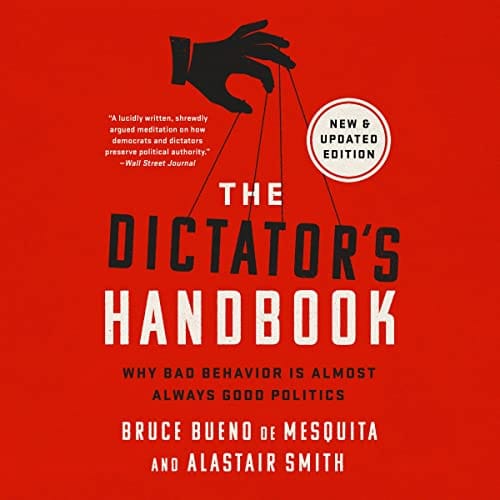Summary of "The Dictator’s Handbook"

🧠 Central Premise:
Politics is not about the people. It’s about staying in power.
Good governance is a happy accident when it aligns with the political self-interest of leaders. Whether in dictatorships, democracies, corporations, or nonprofits, the same survival logic applies: reward your essential backers, punish threats, and control resources.
🧩 The Core Framework: Three Groups in Every Political System
- Interchangeables (Nominal Selectorate) – Everyone who could potentially support the leader (e.g., all citizens).
- Influentials (Real Selectorate) – The subset that actually has some influence (e.g., party members, donors, military).
- Essentials (Winning Coalition) – The few key individuals whose support the leader must have to stay in power.
Leaders cater to their essentials, not the people at large. The smaller the coalition, the easier it is to pay them off with private benefits.
📚 Chapter Highlights:
1. The Rules of Politics
- Leaders don’t rule alone; they rely on a coalition.
- The smaller the coalition, the more extractive and self-serving the regime.
2. Coming to Power
- Leaders rise through:
- Controlling violence (military, police),
- Exploiting instability (coups, deaths, bankruptcies),
- Buying loyalty.
- Democracies need to offer broad-based promises. Dictators only need to pay off a few cronies.
3. Staying in Power
- Reward the coalition → Maintain loyalty.
- Keep supporters uncertain and dependent.
- Rotate people to prevent rival power bases.
4. Steal from the Poor, Give to the Rich
- Taxation is a tool to extract wealth to fund coalition loyalty.
- In small-coalition regimes, wealth flows up.
- The public gets little unless they are essential.
5. Getting and Spending
- Public goods (like roads, education) only exist when:
- The coalition is too big to reward privately,
- It’s more cost-effective to provide shared benefits.
- Example: Clean water is cheap, but many poor countries don’t provide it—because their leaders don’t need to.
6. Corruption is Rational
- Corruption isn’t a bug—it’s a feature.
- In small-coalition regimes, corruption binds supporters to the leader through shared spoils.
- Even in democracies, "small coalitions" exist—e.g., corporate boards, donors.
7. Foreign Aid
- Aid props up dictators by giving them resources to reward their coalition.
- Most aid fails to improve public outcomes.
- Donors give aid to serve their own strategic interests, not out of charity.
8. The People in Revolt
- Revolts succeed when:
- The cost of rebellion drops (e.g., economic crisis),
- The chance of success rises (e.g., elites defect).
- Democracies survive protests by allowing pressure valves (e.g., elections, media).
9. War, Peace, and World Order
- Leaders start wars to boost their domestic position.
- Democracies pick winnable wars; dictators gamble more.
- War outcomes are shaped by survival incentives, not national interest.
10. What Is To Be Done?
- If you want good governance:
- Increase coalition size (free press, elections, accountability).
- Reduce leader discretion over money.
- Don’t trust in leaders’ virtue—change the rules.
🔁 Key Takeaways:
- Bad behavior is often good politics. Leaders aren’t immoral—they’re rational actors responding to the incentives we give them.
- The system, not the person, drives outcomes. Fixing politics means fixing the structure of power, not replacing one leader with another.
- Democracy works better not because leaders are better people, but because they need more people to stay in power.